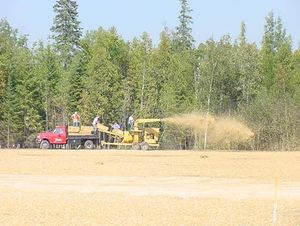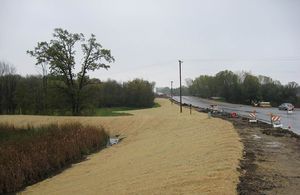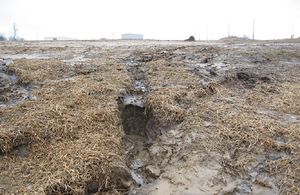
Difference between revisions of "Erosion prevention practices"
m |
PKalinosky (talk | contribs) m (→Related pages) |
||
| (One intermediate revision by one other user not shown) | |||
| Line 45: | Line 45: | ||
==Related pages== | ==Related pages== | ||
| − | *[[Erosion prevention practices]] - Links to a page that provides a portal to information on individual erosion prevention practices | + | *[[Erosion prevention practices]] - Links to a page that provides a portal to information on individual erosion prevention practices. |
| − | *[[Sediment control practices]] - Links to a page that provides a portal to information on individual sediment control practices | + | *[[Sediment control practices]] - Links to a page that provides a portal to information on individual sediment control practices. |
| − | *[[Construction stormwater treatment]] | + | *[[Construction stormwater treatment]] |
| − | *[[Construction practices to minimize sediment discharge]] | + | *[[Construction practices to minimize sediment discharge]] |
| − | *[[Winter construction practices for site stabilization, erosion prevention and sediment control]] | + | *[[Winter construction practices for site stabilization, erosion prevention and sediment control]] |
*[[General principles for erosion prevention and sediment control at construction sites in Minnesota]] | *[[General principles for erosion prevention and sediment control at construction sites in Minnesota]] | ||
*<font size=4>'''NEW!</font size> - '''[[10 Steps to Stormwater Pollution Prevention on Small Residential Construction Sites]]: An interactive image illustrating stormwater practices at small construction sites. | *<font size=4>'''NEW!</font size> - '''[[10 Steps to Stormwater Pollution Prevention on Small Residential Construction Sites]]: An interactive image illustrating stormwater practices at small construction sites. | ||
| Line 59: | Line 59: | ||
<noinclude> | <noinclude> | ||
| − | [[Category:Level | + | [[Category:Level 3 - Best management practices/Construction practices/Erosion prevention practices]] |
</noinclude> | </noinclude> | ||
Latest revision as of 19:21, 19 January 2024
Erosion is the process by which soil, rock, or other material is moved from one location to another, typically through the action of water or wind. Erosion prevention practices are designed to prevent or minimize erosion. Typical erosion prevention practices involve one or more of the following.
- Planning approaches that minimize the size of the bare soil area and the length of time disturbed areas are exposed to the elements – especially for long, steep slopes and easily erodible soils
- Diverting or otherwise controlling the location and volume of run-on flows to the site from adjacent areas
- Keeping concentrated flows in ditches stabilized with vegetation, rock, or other material
- Covering bare soil with vegetation, mulch, erosion control blankets, turf reinforcement mats, gravel, rock, plastic sheeting, soil binder chemicals, etc.
This page provides links to several pages in this manual that address erosion prevention at construction stormwater sites, as well as links to other pages and information related to erosion prevention practices.
Contents
Stabilization and erosion prevention practices
- Stabilization practices
- Erosion prevention practices - temporary seeding and stabilization
- Erosion prevention practices - natural and synthetic mulches
- Erosion prevention practices - tackifiers and soil stabilizers
- Erosion prevention practices - erosion control blankets and anchoring devices
- Erosion prevention practices - turf reinforcement mats
- Erosion prevention practices - Riprap
Photo galleries
- Stabilization practices
- Perimeter control
- Vehicle tracking BMPs
- Outlet energy dissipation
- Check dams (ditch checks, ditch dikes)
- Storm drain inlet protection
Links
- Main construction stormwater page
- Sediment control practices
- General principles for erosion prevention and sediment control at construction sites in Minnesota
- Construction stormwater best management practice – perimeter control fact sheet
- Linear permanent stormwater management design flow chart
- Construction stormwater best management practice – Constructing infiltration systems
- Construction stormwater best management practice – Concrete, paint, stucco and other washout guidance
- EPA Concrete Washout Stormwater Best Management Practice
- Construction stormwater best management practice – buffer zones
- Construction stormwater best management practice – Site stabilization
- Construction stormwater – Top 5 permit violations
Related pages
- Erosion prevention practices - Links to a page that provides a portal to information on individual erosion prevention practices.
- Sediment control practices - Links to a page that provides a portal to information on individual sediment control practices.
- Construction stormwater treatment
- Construction practices to minimize sediment discharge
- Winter construction practices for site stabilization, erosion prevention and sediment control
- General principles for erosion prevention and sediment control at construction sites in Minnesota
- NEW! - 10 Steps to Stormwater Pollution Prevention on Small Residential Construction Sites: An interactive image illustrating stormwater practices at small construction sites.
- Links for construction stormwater
- Construction stormwater inspection checklist
Permit applicability
Warning: The Construction Stormwater General permit states "The Permittee(s) must stabilize all exposed soil areas (including stockpiles)." For more specific information, see Part IV.B.2 of the permit.
This page was last edited on 19 January 2024, at 19:21.


